Princess Essex, Shakespeare’s Globe review
In August 1908, Princess Dinubolu of Senegal became the first black woman to enter a British beauty competition at The Kursall Palace, Southend. Despite a warning about ‘local prejudice’ from the competition’s organisers, Dinubolupersevered, telling press ‘people have told me that only cream-and-pink little English misses can win... I wish to prove them wrong.’
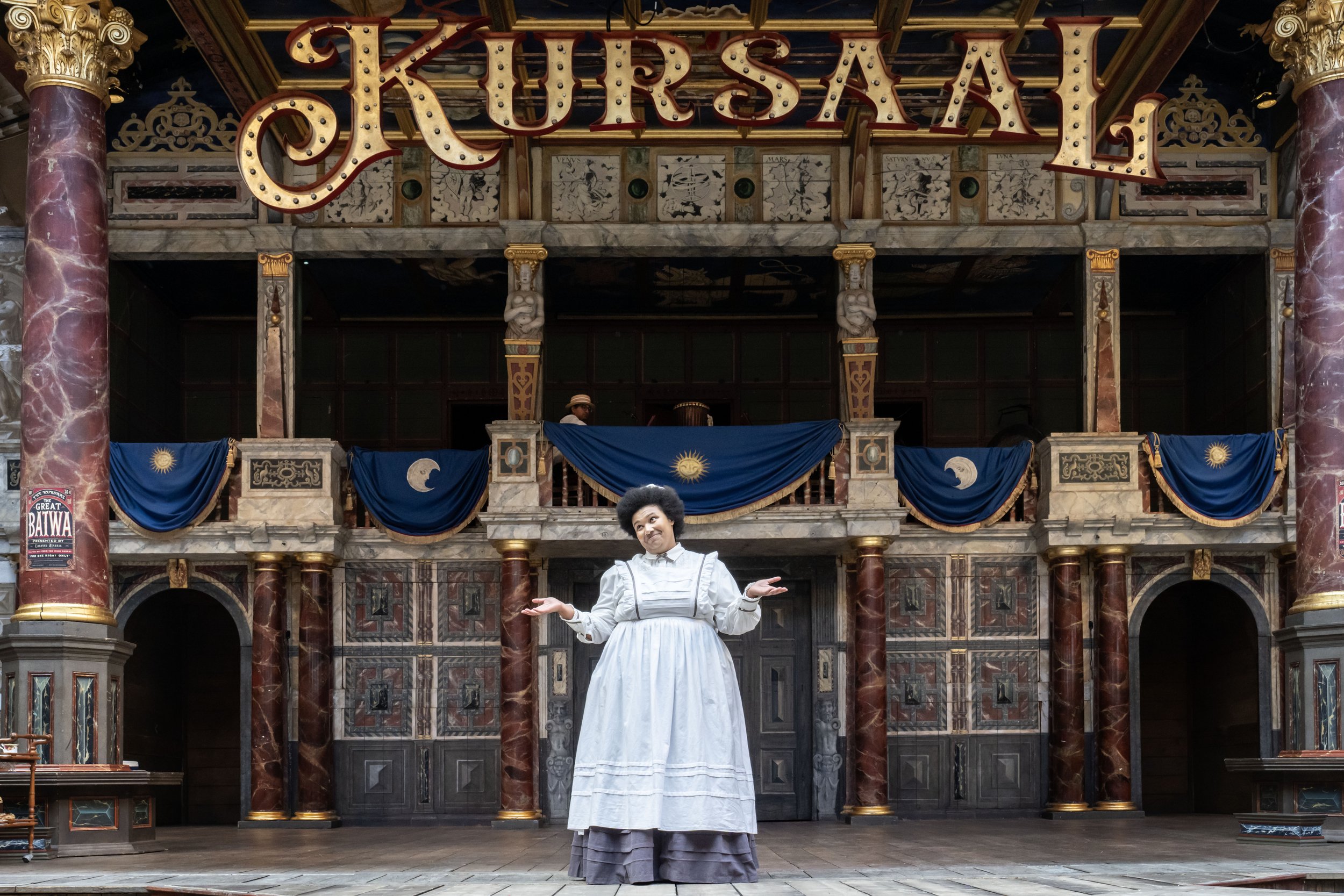
Princess Essex, written by and starring Anne Odeke, and directed by Robin Belfield. Photo credit Johan Persson.
Little more is known of Princess Dinubolu – after being the centre of Southend’s pageant controversy, she seems to have disappeared into the shadowy footnotes of the history books. Anne Odeke’s new play, Princess Essex, explores those shadows, reimagining the story of Dinubolu in an over the top and often hilarious critique of empire, imperialism and the power and racial dynamics of Edwardian England.
Odeke herself plays Joanna, an orphaned local maid to wealthy white woman Mrs Bugle (a brilliant Lizzie Hopley). A night out at the Kursaal with Mrs Bugle turns Essex-born Joanna’s world upside down as she is confronted by the spectacle of the Great Batwa, an African pygmy chief paraded around the stage and forced to perform for his supper.
It is from here that the plot of Princess Essex gathers pace, as Joanna abandons the hapless Mrs Bugle in a quest to ‘save’ Batwa. Instead, she comes face to face with a stage persona that plays into the British Empire’s fascination for the exotic other, and is set on her own journey to confront the white ideals of Southend’s beauty pageant through a new identity – Princess Dinubolu of Senegal.
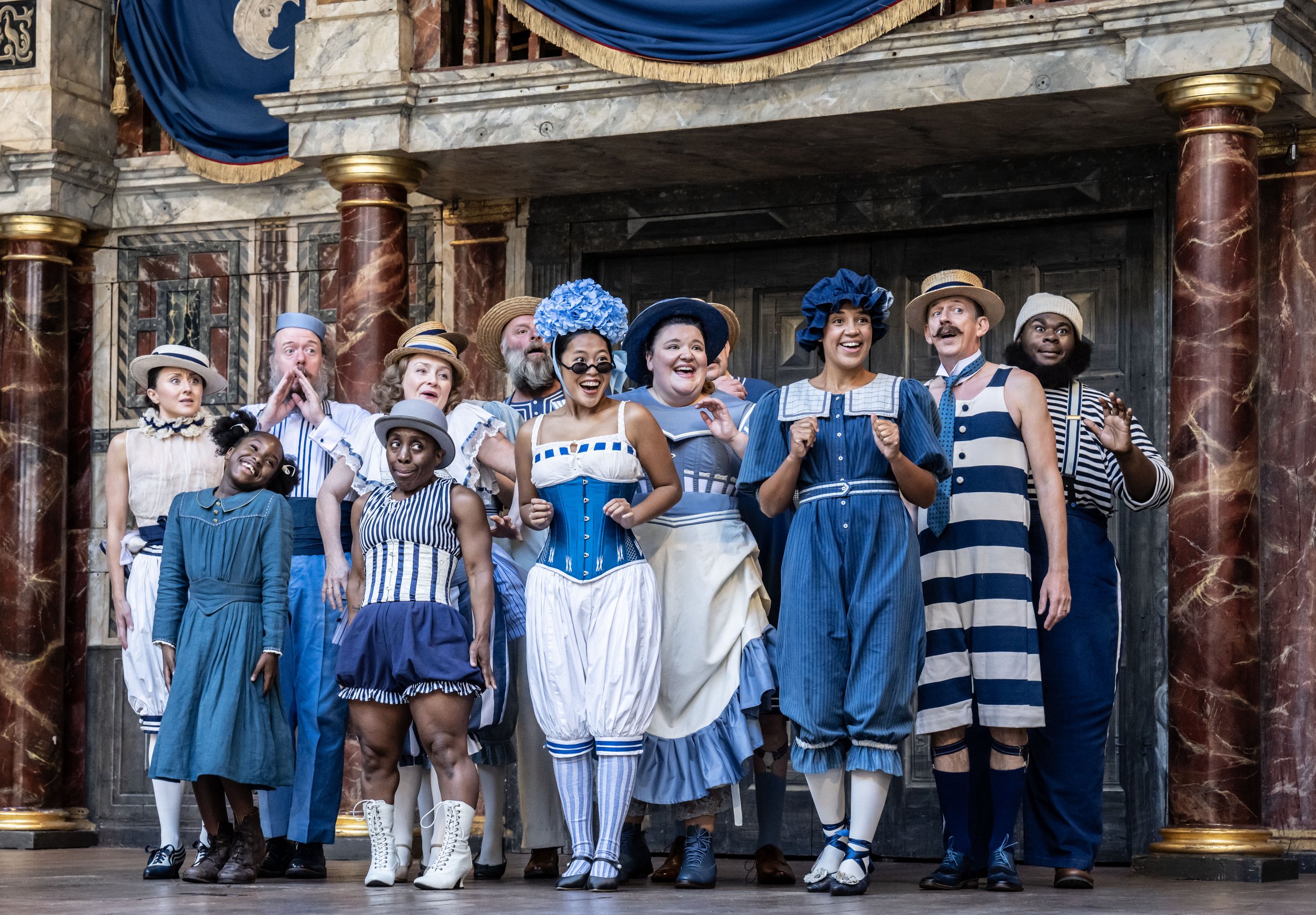
Princess Essex, written by and starring Anne Odeke, and directed by Robin Belfield. Photo credit Johan Persson.
The Globe is transformed into a twentieth-century seaside resort and the performance has all the delight and excitement of a Edwardian music hall production. A buoyant rendition of ‘oh I do like to be beside the seaside’ opens the show, complete with a nautical striped and bloomer-clad ensemble who give the at-times challenging subject matter a sparkling, light-hearted veneer.
Odeke is a delight both as Joanne and Princess Dinubolu, in an endearing and magnetic performance that movesseamlessly from comedy to more considered explorations of prejudice and identity. The ensemble cast is equally impressively, adeptly shape shifting between a wide range of characters and costumes without missing a beat. In particular, Eloise Seckler is brilliant as Violet, the highly-strung and demanding daughter of the Mayor of Southend.
The fast-paced writing is brilliantly funny, and the whole production fizzes with energy. The audience chimes in at all the right moments with well-timed gasps and bursts of laughter that are a testament to Odeke’s script. However, at times Joanna’s story risks being lost to several convoluted subplots involving a sex-mad King Edward and a disobedient maid who joins the women’s suffrage moment. At these moments, Princess Essex risks veering slightly too far towards the pantomime and distracting from the character at its core.
As the first black woman to star in her own play at the Globe, there are poignant parallels between Joanna’s story and Odeke’s own. ‘It’s important we ask ourselves why we can’t answer’ says Odeke of the mystery surrounding Princess Dinubolu. In this production, the absence of information speaks volumes – for all its apparent light-heartedness, this is an important story that rewrites the role black women play in the history of the empire.
Princess Essex is showing at Shakespeare’s Globe until October 26. Find out more and buy tickets here.
Words by Ellen Hodgetts
What’s On in London This Week: Discover rooftop games at Roof East, cherry blossoms at the Horniman Gardens, and Easter fun at Hampton Court Palace. Plus, catch Loraine James live, Dear England at the National Theatre, and jazz nights at Ladbroke Hall…
London is set to showcase a rich and varied programme of art exhibitions this May. Here is our guide to the art exhibitions to watch out for in London in May…
With summer around the corner, what better way to spend a sunny day than by enjoying art, culture, and a bit of al fresco dining? Whether you’re looking for a peaceful spot to reflect on an exhibition or simply want to enjoy a light meal in the fresh air, here’s our guide to some of the best museum and gallery cafés with outdoor terraces in London….
As summer arrives in London, there’s no better time to embrace the city’s vibrant outdoor dining scene. Here is our guide to the best outdoor terraces to visit in London in 2025 for an unforgettable al fresco experience…
Wildlife Photographer of the Year 2025 · Gabriel Moses: Selah · Eileen Perrier: A Thousand Small Stories · Dianne Minnicucci: Belonging and Beyond · Linder: Danger Came Smiling · The Face Magazine: Culture Shift · Cecil Beaton’s Fashionable World · Deutsche Börse Photography Foundation Prize 2025 · Photo London 2025 · Taylor Wessing Photo Portrait Prize · Nature Study: Ecology and the Contemporary Photobook · Flowers – Flora in Contemporary Art & Cultur…
This April, Ladbroke Hall’s renowned Friday Jazz & Dinner series returns, showcasing an impressive roster of artists at its Sunbeam Theatre. Each evening pairs exceptional live jazz with a carefully crafted menu from the award-winning Pollini restaurant…
Holly Blakey: A Wound with Teeth & Phantom · Kit de Waal: The Best of Everything · Skatepark Mette Ingvartsen · Spring Plant Fair 2025 · Hampton Court Palace Tulip Festival 2025 · Loraine James – Three-Day Residency · Jan Lisiecki Plays Beethoven · Carmen at The Royal Opera House · Cartier Exhibition · The Carracci Cartoons: Myths in the Making · Nora Turato: pool7 · Amoako Boafo: I Do Not Come to You by Chance · Bill Albertini: Baroque-O-Vision Redux…
Murder She Didn’t Write is misbehaviour live on stage peppered with self-awareness and unbelievably good writing. This isn't a fad, this isn't sloppy - it’s naughty and scathingly witty…
Robyn Orlin had her first encounter with the rickshaw drivers of Durban at the young age of five or six, an experience that left such a deep impression on her that she later sought to learn more about their fate. Rickshaws were first introduced to Durban in 1892…
TOZI, derived from the affectionate Venetian slang for “a close-knit group of friends,” is the brainchild of an Italian trio that met while opening Shoreditch House under the Soho House Group. In 2013, Chef Maurilio Molteni, fresh from his time as Head Chef at Shoreditch House and developing the menu at Cecconi’s, opened the first TOZI restaurant in London…
Multitudes at Southbank Centre will reimagine live music through bold collaborations across dance, theatre, and visual arts…
Multitudes Festival · Ed Atkins, Tate Britain · Brick Lane Jazz Festival · Teatro La Plaza’s Hamlet · Holly Blakey: A Wound with Teeth & Phantom · Roof East · Hampton Court Palace Tulip Festival 2025 · London Marathon 2025 · ROOH – Within Her · Sultan Stevenson Presents El Roi · Carmen at The Royal Opera House · The Big Egg Hunt 2025 · Architecture on Stage: New Architects · The Friends of Holland Park Annual Art Exhibition 2025
Autumn 2025 will bring two exciting exhibitions to the Barbican: ‘Dirty Looks’, a bold fashion exhibition exploring imperfection and decay, and an innovative art installation by Lucy Raven in The Curve…
Robyn Orlin: We wear our wheels with pride · Architecture on Stage: Lütjens Padmanabhan · Jay Bernard: Joint · Black is the Color of My Voice · Joe Webb Trio · Rhodri Davies at Cafe OTO · Sunday Times Young Writer of the Year Award 2025 · Lyon Opera Ballet: Cunningham Forever · AVA London · Sister Midnight · Astonishing Things: The Drawings of Victor Hugo · Eunjo Lee · Arpita Singh: Remembering · Fiona Banner aka The Vanity Press: Disarm · Bunhead Bakery · Time & Talents
Looking for something truly special this Mother’s Day? There are a variety of unique gifts and experiences to take advantage of in London, whether your mother loves exploring world-class art galleries and museum exhibitions, wandering through historic homes filled with fascinating stories and remarkable collections, indulging in a luxurious spa treatment, or enjoying an unforgettable dining experience..
After 18 successful years at Edinburgh Fringe, The Big Bite Size Show arrives in London for the first time at The Pleasance Theatre, no less. A gem of a place for fringe theatre in London…
180 Studios will present the largest showcase of photographer and filmmaker Gabriel Moses’ work to date, featuring over 70 photographs and 10 films in March…
Cartier Exhibition at the V&A · Giuseppe Penone: Thoughts in the Roots · Antony Gormley: WITNESS · Richard Wright at Camden Art Centre · The Carracci Cartoons: Myths in the Making · Eileen Perrier: A Thousand Small Stories · Ed Atkins at Tate Britain · Richard Hunt: Linear Peregrination · Nolan Oswald Dennis at Gasworks · Nora Turato: pool7 · In House: Ree Bradley and Pete Gomes at Studio Voltaire…
The Shirley Sherwood Gallery of Botanical Art at Kew Gardens will showcase new botanical works, cinematic installations, and the connections between artists and trees…
Orchid Festival · Alice Sara Ott: John Field & Beethoven · Our Mighty Groove at Sadler’s Wells East · Seth Troxler at Fabric · North London Laughs – A Charity Comedy Night · London Symphony Orchestra: Half Six Fix – Walton · In Focus: Amir Naderi · Artist Talk: Citra Sasmita - Into Eternal Land · Noah Davis at Barbican · Theaster Gates: 1965: Malcolm in Winter: A Translation Exercise · Ai Weiwei: A New Chapter · Galli: So, So, So · Somaya Critchlow: The Chamber
An important exhibition has opened at the National Gallery co-organised with the Metropolitan Museum of Art. The Mayor of Siena, Nicoletta Fabio was in attendance on opening day to mark the exhibitions significance. Normally a major exhibition would take two to three years to come to fruition, in this instance, it has been in the making for eight year…
Máret Ánne Sara to create 2025 Hyundai Commission as Tate and Hyundai extend partnership to 2036.
Claudia Pagès Rabal: Five Defence Towers · Tirzah Garwood: Beyond Ravilious · Heather Agyepong: Through Motion · Christina Kimeze · Citra Sasmita: Into Eternal Land · Mire Lee: Open Wound · Linder: Danger Came Smiling · Galli: So, So, So · Mickalene Thomas: All About Love …
Marylebone Village to host a week of events championing female founders and entrepreneurs, including a panel discussion and fundraising for the Marylebone Project…
Battersea Power Station will host Good Fit, a month-long event featuring workouts, mindfulness sessions, expert talks, and wellness experiences…
Trisha Brown Dance Company & Noé Soulier – Working Title & In the Fall · (LA)HORDE / Ballet National de Marseille – Age of Content · Lyon Opera Ballet – Merce Cunningham Forever (BIPED and Beach Birds) · Neither Drums Nor Trumpets – Pam Tanowitz · Robyn Orlin – We Wear Our Wheels with Pride
Splash! A Century of Swimming and Style · Astonishing Things: The Drawings of Victor Hugo · Arpita Singh: Remembering · 2025 Deutsche Börse Photography Foundation Prize · The Craft of Carpentry: Drawing Life from Japan’s Forests · Grayson Perry: Delusions of Grandeur · Edvard Munch: Portraits · Ficre Ghebreyesus · Textiles: The Art of Mankind · Eunjo Lee…
Highsnobiety: Not In London · LFW Pop-Up Shop · 1664 Blanc Activation · Alo Wellness Activations · Dylon Detergent Pop-Up: Rethink New Laundrette · Morocco - Kingdom of Light at LFW · Pandora x Priya Ahluwalia Collection · Rixo Exclusive Event · Grow Hackney · Meanwhile…In Shoreditch · DREST · LFW Solana X HAPE Social X Never Fade Factory · London College of Fashion, UAL · Margaret Howell · Nosakhari: Able-Graphy Exhibition · Nosakhari · NET-A-PORTER…





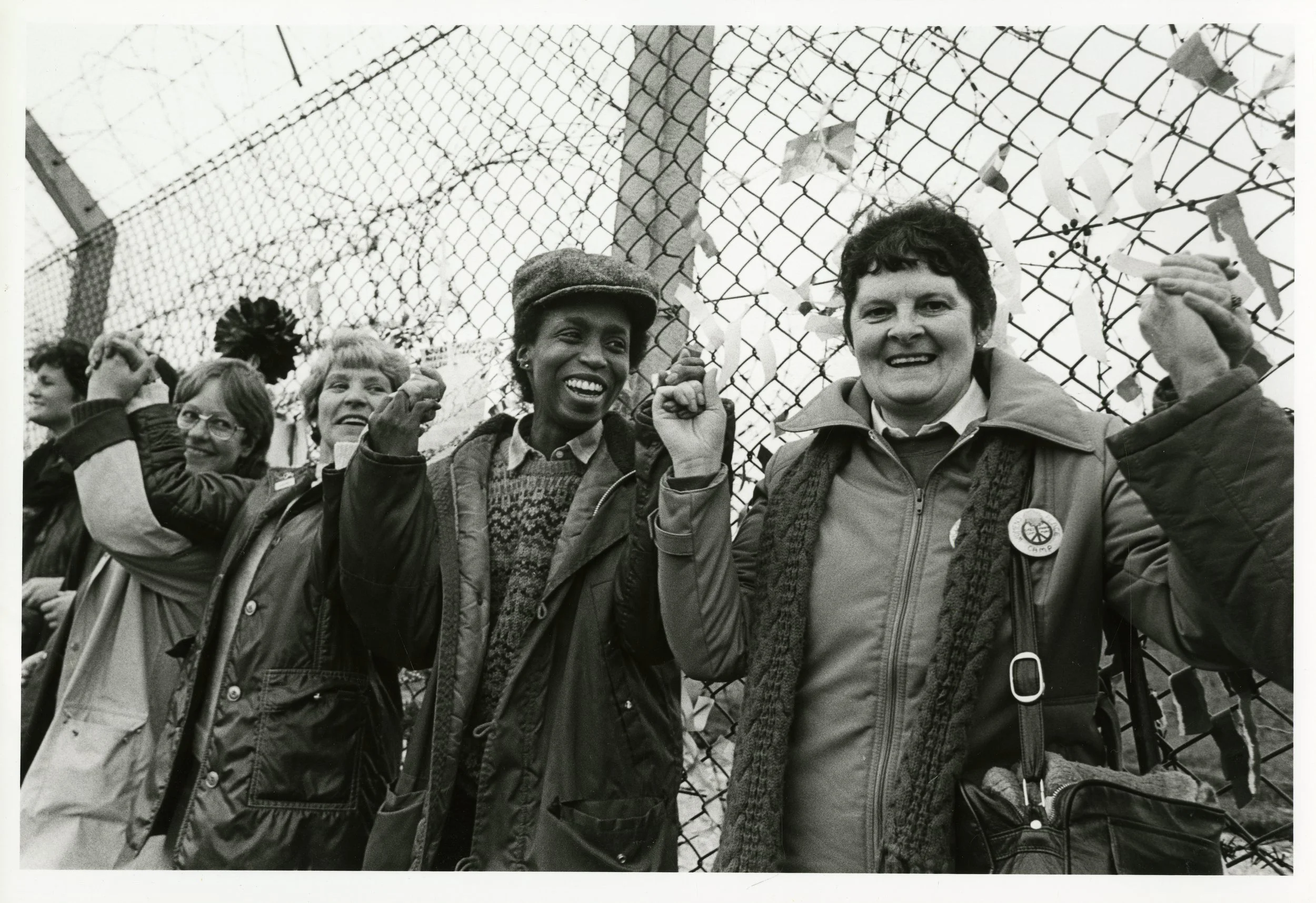



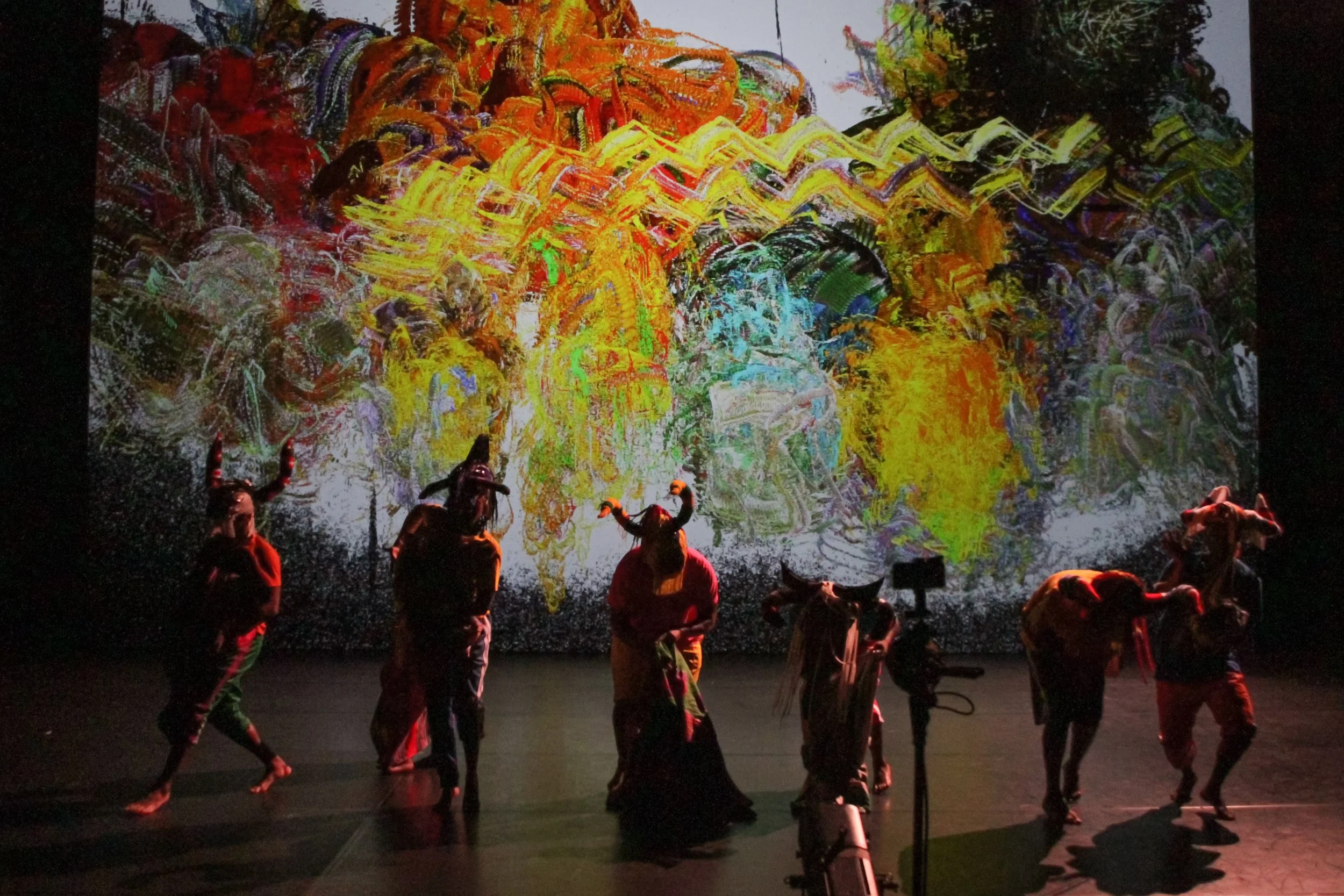







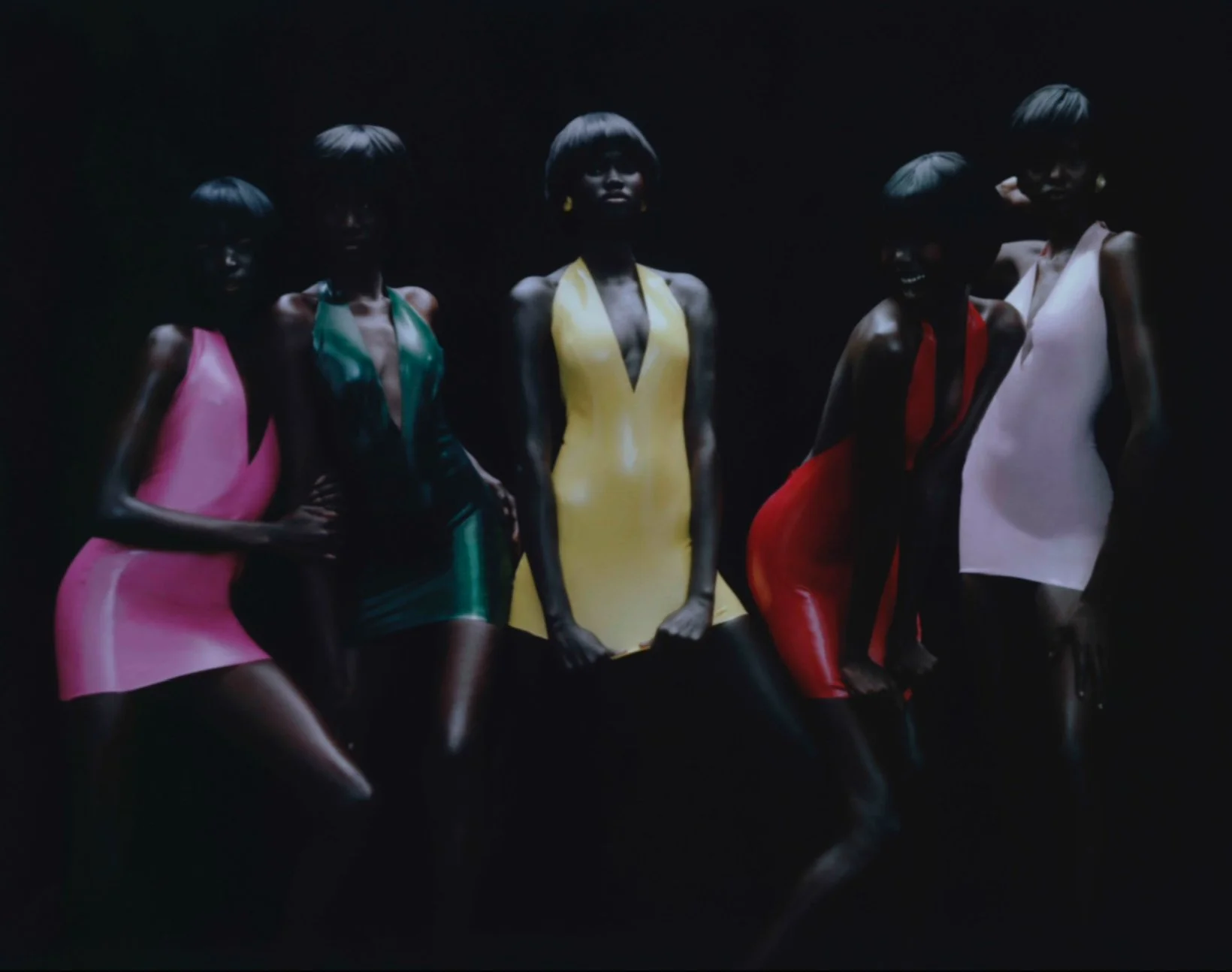














The Cinnamon Club had completely flown under the radar for me. It is in a pocket of London I rarely visit, and even if I did, the building’s exterior gives little indication of what’s inside. But now that I’ve discovered it, I already have plans to return with my husband - and in my mind, a list of friends I would recommend it to…